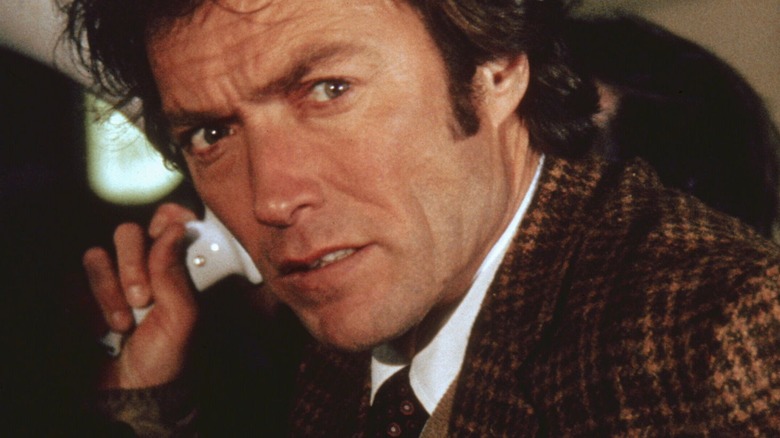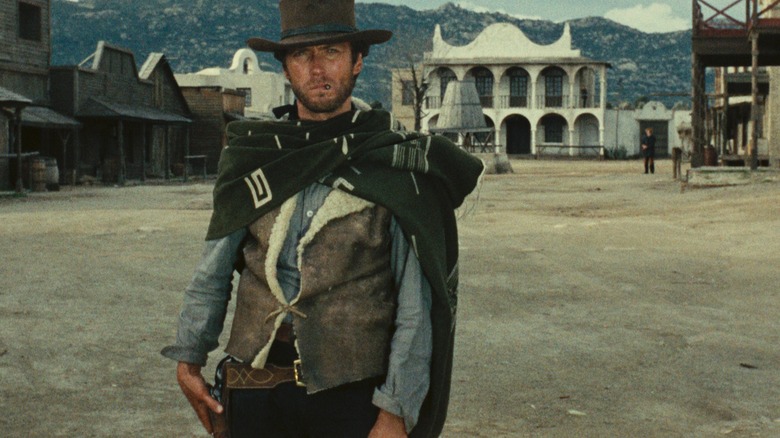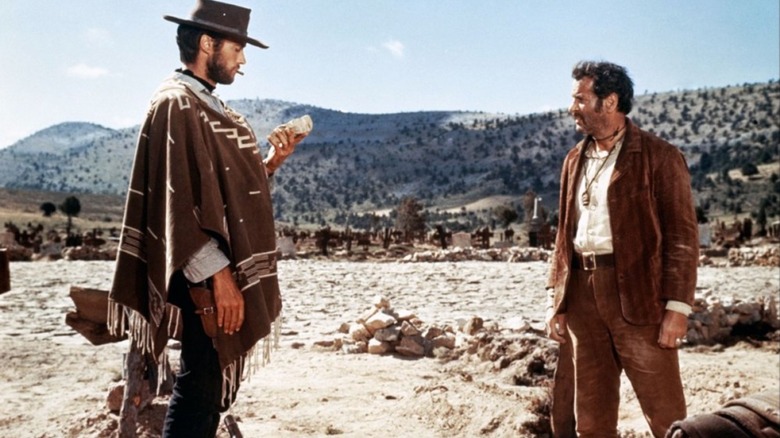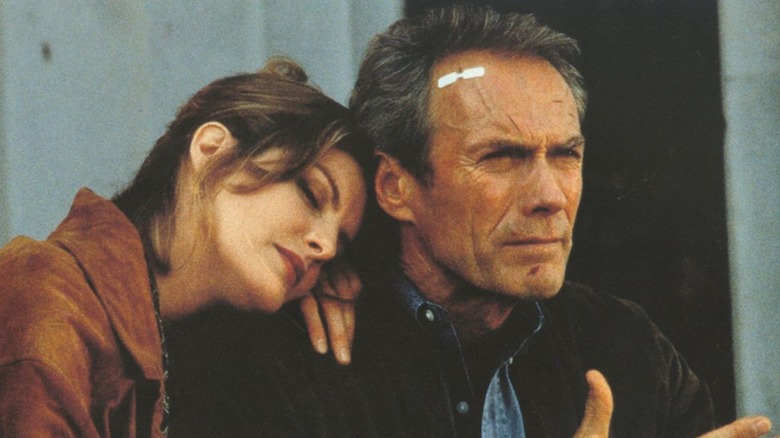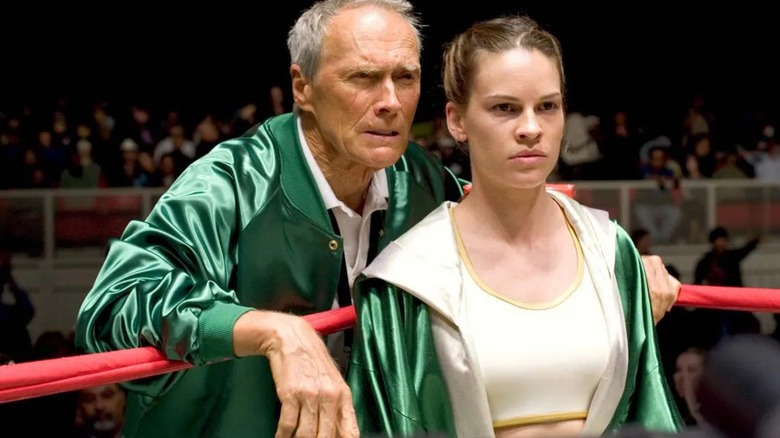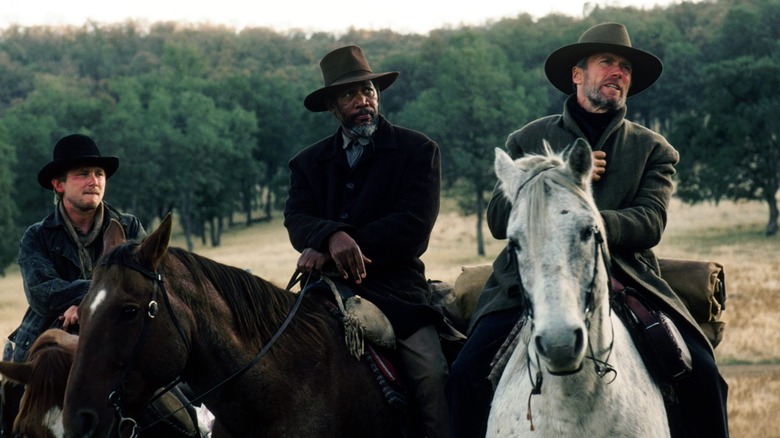The 5 Best Clint Eastwood Movies, According To Rotten Tomatoes
It is borderline impossible to define the six-decade-long artistic legacy that Clint Eastwood had painstakingly mapped, as his stacked filmography includes everything from certified classics to overlooked gems. Of course, no artist can have an impeccably perfect run, but some, like Eastwood, inch very close to that ideal by re-defining entire genres that will always have a place in cinematic history. Not every good film that Eastwood helmed or starred in made a ton of money at the box office, but artistic success cannot be solely measured via such narrow metrics, as his name is embedded into the public consciousness, for better or worse.
It is tempting to dissect Eastwood's artistry purely through the Western genre — works like "A Fistful of Dollars" or "The Outlaw Josey Wales" capture his contributions succinctly — but there is much more to him than a drawling accent or laidback gunslinging. The actor has often been drawn to stories that explore the depths of human connection, such as his role in "The Bridges of Madison County," where photographer (and loner) Robert Kincaid experiences the tender bitterness of a love unactualized. There are also grittier, darker films like "Tightrope," where he slips into the shoes of detective Wes Block, who inadvertently involves himself in a murder-abuse case he is meant to solve, prompting him to take a step back and look into the depths of his own soul.
Eastwood has played both rebellious hero figures and antiheroes worth rooting for, introducing an edge to every character that is worth looking into. Although the sheer breadth of Eastwood's talents cannot be quantified through lists or rankings, here are 5 best Clint Eastwood movies as per Rotten Tomatoes.
A Fistful of Dollars (1964)
The inception of Leone's "Dollars" trilogy was fueled by the need to pay homage to Akira Kurosawa's stellar, immaculate "Yojimbo," filtered through the lens of a spaghetti Western with a charismatic leading man. Eastwood was an unconventional choice at the time, as he had yet to taste superstardom, but Leone's instincts were proved right with a "Fistful of Dollars," which subverts traditional genre expectations while adhering to the foundational idea of it. The Man with No Name immediately makes an impression with his need to make the most out of chaos, where he pledges his services as a hired gun to warring factions for a motivation as old as time: doubled monetary profits.
There is no dearth of spectacle here, replete with mega-dramatic close-ups that Leone embraces without restraint, but they contribute to racking up the tensions before a gunfight or underlining character motivations that might get lost amid the violence. The transition that Joe, our hired gun, undergoes is nothing novel, but it is thrilling to see Eastwood's character shed the drilled-in apathy that his profession demands and inch towards a more compassionate outlook. The direct reference to a scene in "Yojimbo," where the sword-wielding samurai defeats a man with a gun, is granted a clever twist when Joe survives a rifle shot by blocking it with an iron plate beneath his robes.
Although it is tough to eclipse Masaru Sato's jarring soundscape that drives Kurosawa's classic, Ennio Morricone comes close with his own sonic flair. The film is currently sitting at 98% on Rotten Tomatoes, which it absolutely deserves.
The Good, The Bad and The Ugly (1967)
The final entry in Sergio Leone's "Dollars" Trilogy is an unforgettable one, acting as a culmination point for Eastwood's "Man with No Name," which plunged the actor-director into mainstream success. The very concept of a spaghetti Western gets dissected and rearranged here, where moral compasses come to define the characters at the center. Against Eastwood's bounty hunter, Blondie ("The Good"), is Lee Van Cleef's remorseless killer ("The Bad"), and Eli Wallach's ruthless, coarse Tuco ("The Ugly"). The distinctive morality of the three men dictates how they make themselves known, served up with distinctive panache that would influence the Western genre for years to come.
The plot here is pretty straightforward: the three gunslingers are competing to get their hands on $200,000 in stolen Confederate gold, which is a journey marked with unexpected partnerships and sudden betrayals. Their relationship with one another can be classified as contentious, but all of them kill on the move, and Blondie's sense of "goodness" hinges on the "who attacked first" principle, where his violence is contextualized as a reaction to an attempt on his life and personhood. There is a touch of absurdity to this experience, a penchant for diving into excesses, but that is exactly what makes "The Good, The Bad and The Ugly" come alive in such a singular way, with Ennio Morricone's urgent score bringing everything full circle. The film's 97% Rotten Tomatoes score sounds about right. Good stuff.
In The Line of Fire (1993)
Veteran Secret Service Agent Frank Horrigan is a haunted man. Still overly critical of his failures during the assassination of John F. Kennedy some 30-odd years ago, Horrigan's predicament takes a turn for the worse when a conniving, creepy assassin — who goes by Booth (John Malkovich), among other aliases — taunts him with threats to kill the current President. What ensues is a mad, unpredictable game with heightened stakes, unleashing in the form of a highly engaging thriller whose brilliance hinges on the escalating tensions between a hero desperate to prevent past mistakes and a villain who thrives on devastation and misery.
Much of the praise that "In The Line of Fire" deserves should be directed towards Wolfgang Petersen's masterful, taut direction, where thrills go hand in hand with character depth, creating a compelling larger picture. There is a palpable sense of danger to the missions and assignments that Horrigan and his partner Al D'Andrea (Dylan McDermott) are seen tackling and the appearance of an unhinged killer lays the foundation for events to descend into chaos. Malkovich embodies his character to the nastiest extremes, playing a part so slimy and vicious that it is often difficult to envision Horrigan winning against someone so thoroughly evil.
Moreover, not every moment is plunged in such dire tints, as Rene Russo's Agent Lilly Raines helps balance out Horrigan's ever-wary outlook with a romance that does not feel out of place. The film currently sports a 96% on the Tomatometer, and if you haven't checked it out yet, I sincerely urge you to do so.
Million Dollar Baby (2004)
This Eastwood-directed boxing melodrama is more than just about the sport; if anything, boxing is employed as a metaphor for the toils of existence as an underdog. 32-year-old Maggie (Hilary Swank) is a service worker who struggles to make ends meet and aspires to be more: a boxing champion, but in order to do that, she needs to convince Frankie Dunn (Eastwood) to train her. Dunn is anything but warm towards her at first, but a very convincing Eddie Dupris (Morgan Freeman) makes it happen, marking the beginning of a journey both exhilarating and heartbreaking. There is a sense of authentic desperation and drive embedded in Maggie's story, which brims with hopeful empowerment for the most part, but ultimately ends on an unbelievably bleak and depressing note that evokes complicated emotions.
There are aspects to this narrative that might feel dated or problematic when subjected beyond surface-level analysis, but it is a straight-cut, traditional exploration of the American Dream, its allure and pitfalls, and how redemption often comes at a heavy price. Eastwood brings depth to Dunn, softening the has-been boxing trainer's jagged edges over the course of his arc, with a brilliant Swank to ground the more saccharine aspects of this tearjerker of a classic. "Million Dollar Baby" sports a 90% on the Tomatometer, and in case you wish to balance out the emotional excesses of this entry, the 1974 crime-comedy, "Thunderbolt and Lightfoot" — where an unforgettable Eastwood-Jeff Bridges combo makes wacky, eccentric shenanigans come alive — will definitely do the trick.
Unforgiven (1992)
Another Eastwood-helmed banger, 1992's "Unforgiven" focuses on two gunslinging groups hoping to collect a reward for a murder in Big Whiskey, Wyoming. Among them is one William Munny (Eastwood), someone who "killed women, children ... and just about anything that walks or crawls at one time or another." However, Munny's indiscriminate ruthlessness has dulled over time, and he's a family man now, who embarks on this final quest with his trusty friend Ned Logan (Morgan Freeman) by his side. The rival group, headed by English Bob (Richard Harris), clashes with his own, re-igniting Munny's vengeful instincts, which seem to have been buried beneath layers of hopeful redemption and the comfort of domestic bliss.
It would be insincere to toss around the term "masterpiece" as often, but Eastwood's Western does embody every qualifier for the term: it is a scathing, uncompromising, and profound slice of the genre that does not bother to romanticize its unsavory aspects. "I'm just a fella now. I ain't no different than anyone else no more," Munny claims in reference to his bloody past and humdrum present, but fate has other plans when his dear friend Ned needs to be avenged. It is also a visually stunning experience that is packed with standout performances, while the film's ending raises pertinent questions about the noxious relationship between violence, masculinity, and expectations surrounding forgiveness. The film currently holds a 96% rating on Rotten Tomatoes.
